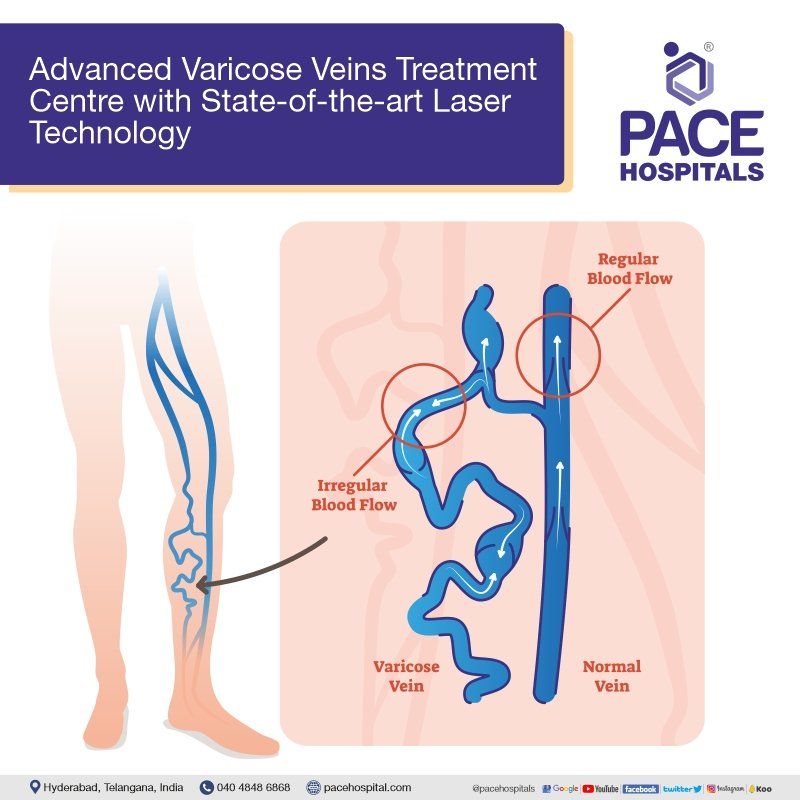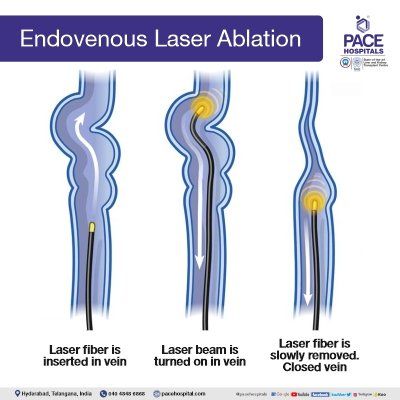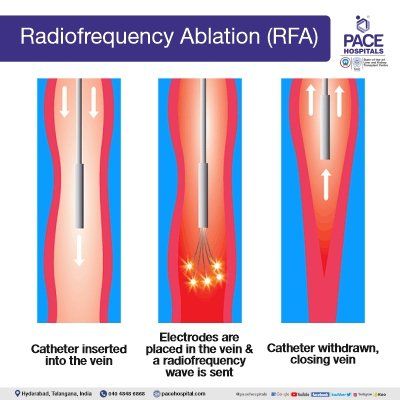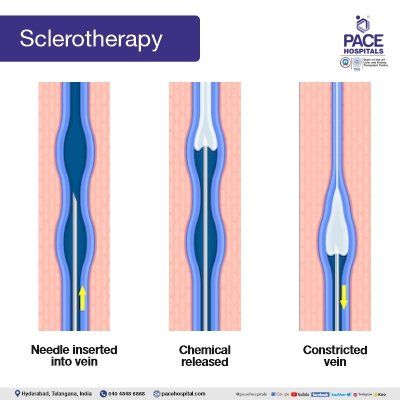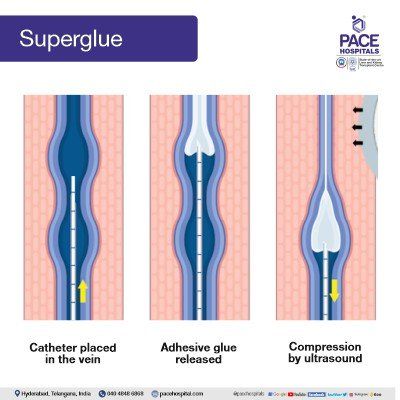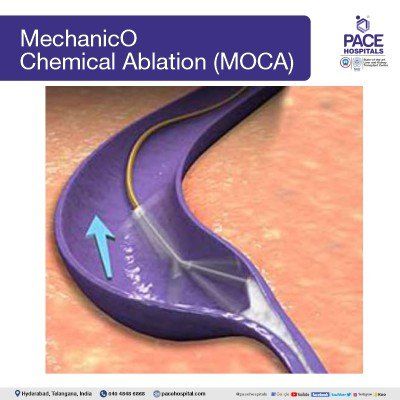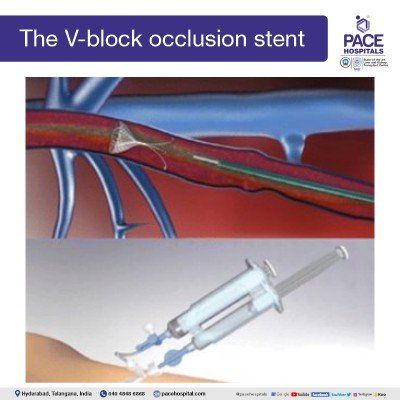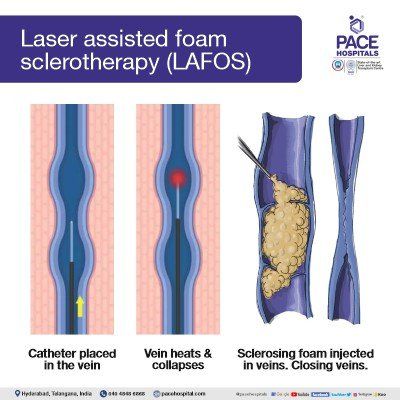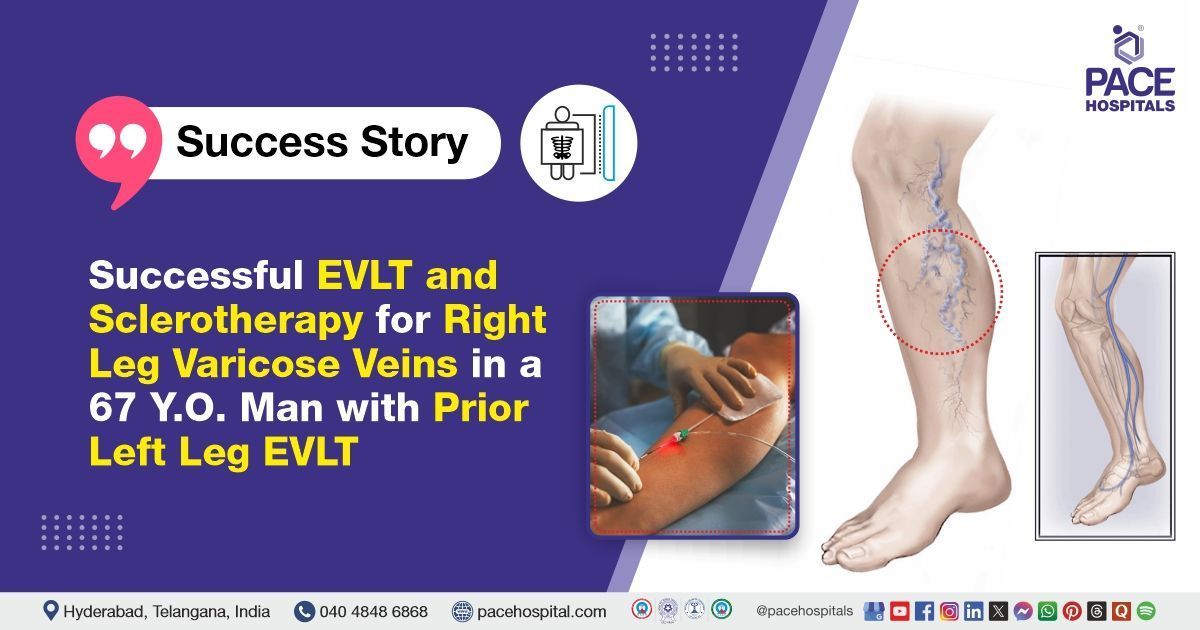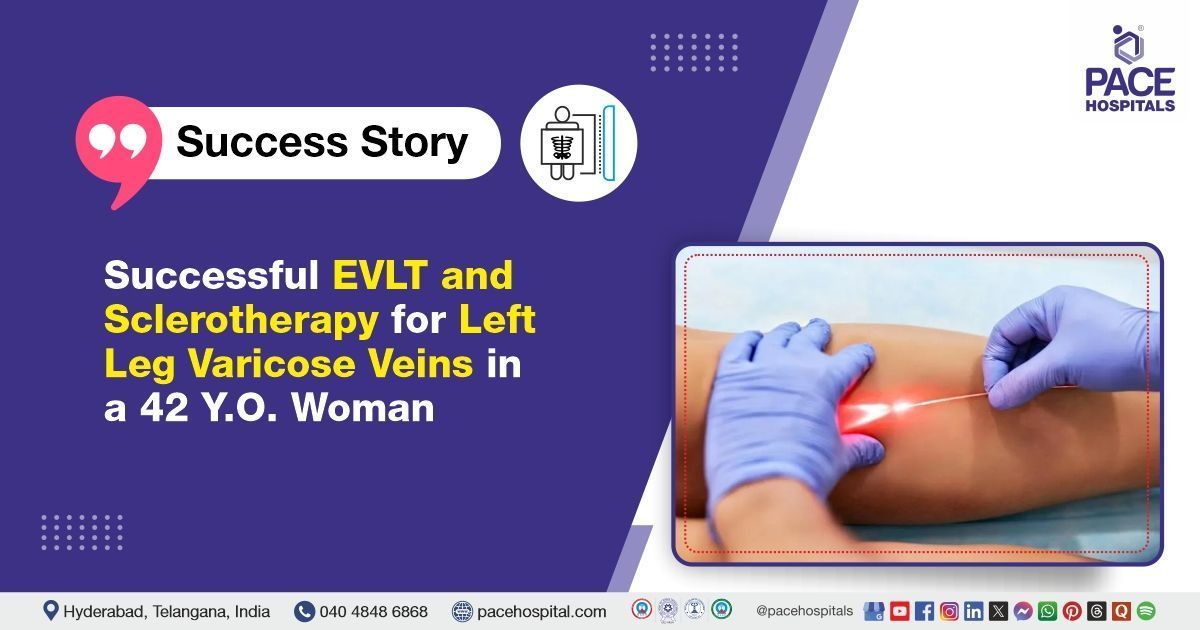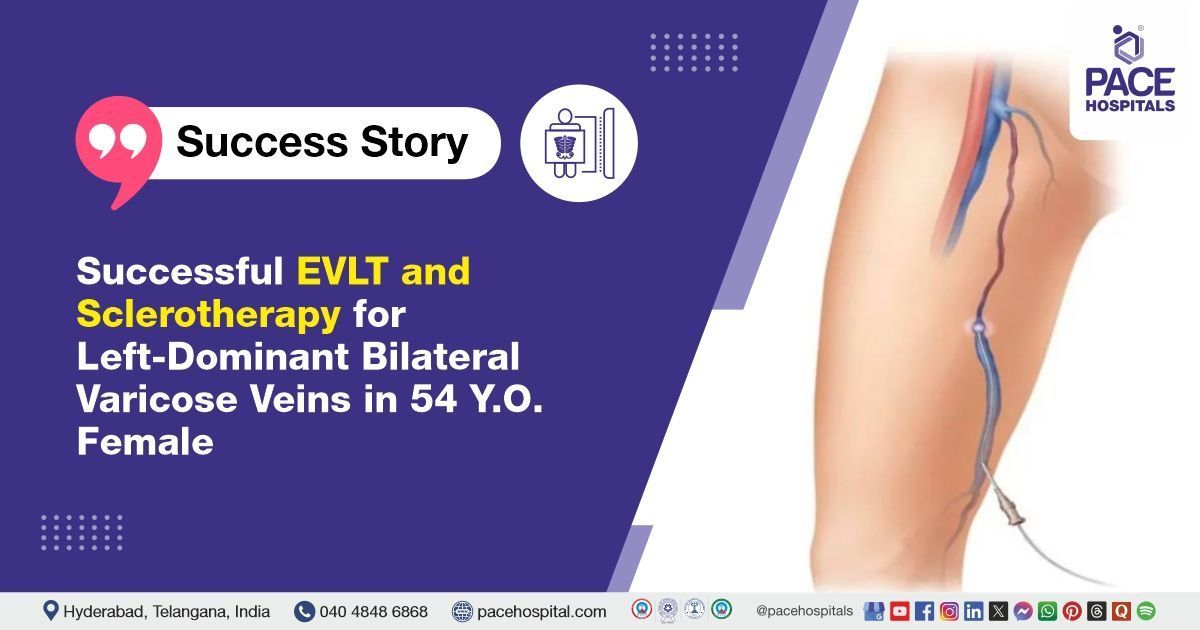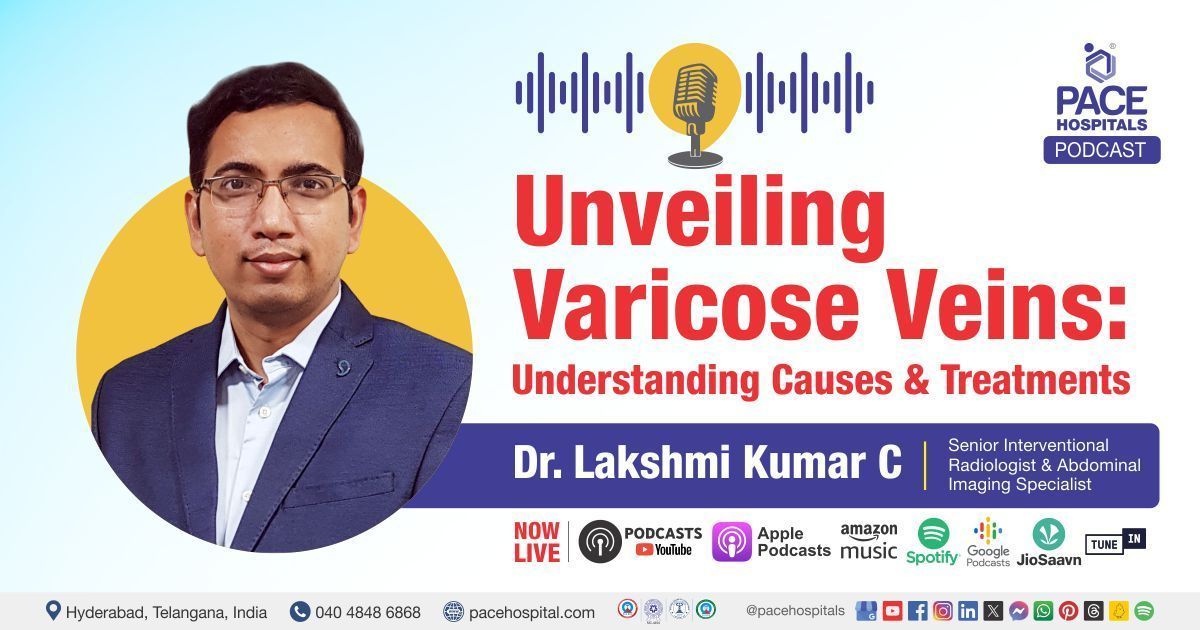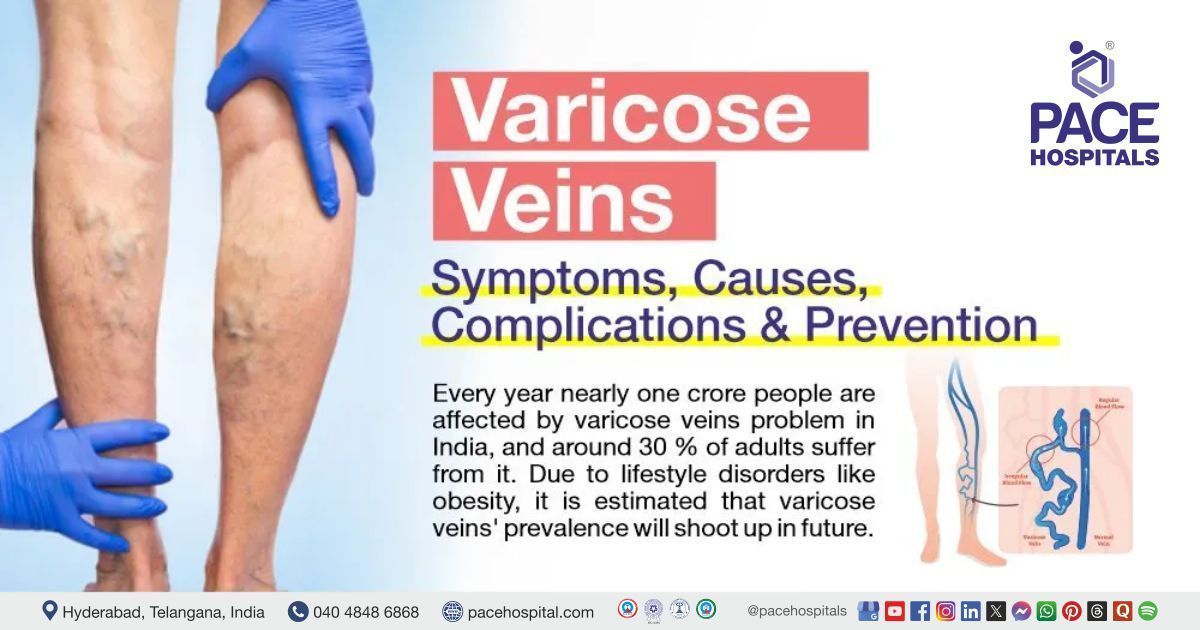Varicose Veins Treatment in Hyderabad | Surgery and Cost
At PACE Hospitals, team of varicose veins specialist - Interventional radiologists and surgeons are experienced in handling even the most complicated cases of varicose veins, and expertise in performing varicose veins surgery with using advanced interventional techniques involving laser treatment for varicose veins with minimal time and high success rate. The treatment options available are:.
- Endovenous Laser Ablation Therapy (EVLT)
- Radiofrequency Ablation Therapy (RFA)
- Sclerotherapy
- Superglue
Request Appointment for Varicose Veins Treatment
Varicose Veins Treatment - appointment
Why Choose PACE Hospitals for Varicose Veins Treatment?
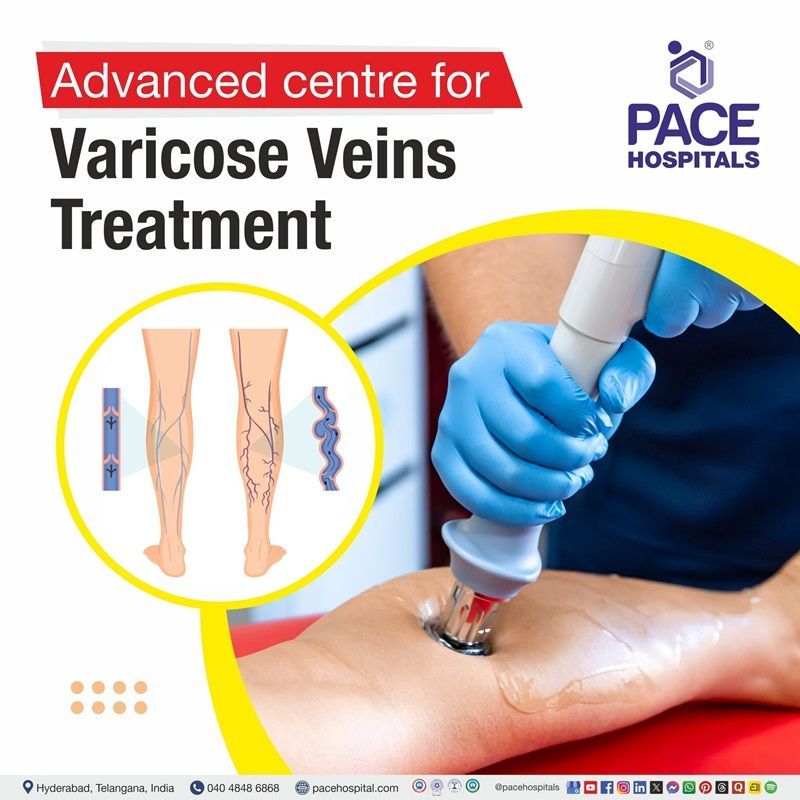
200+ Laser Treatment for Varicose Veins
Team of the best varicose veins specialist with 20+ years of expertise
Cost-effective treatment with 99.9% success rate
All insurance accepted with No-cost EMI option
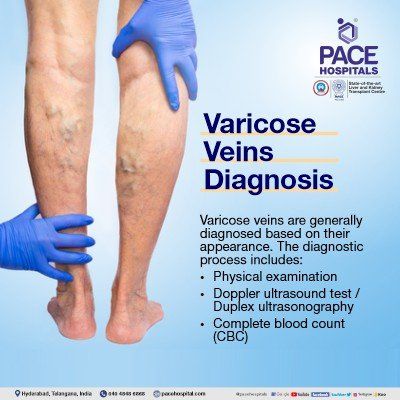
Diagnosis of Varicose Veins
Varicose veins are generally diagnosed based on their appearance. The diagnostic process includes a physical examination. During physical examination, the experts will examine the veins and the surrounding areas and check for the symptoms like swelling, heat, or redness to diagnose varicose veins and related complications.
The health care experts may check the pulse near the varicose veins to identify if there is a blood flow problem, along with a few questions regarding the symptoms and risk factors.
The healthcare experts may request some diagnostic tests to determine the diagnosis. You may need to undergo a type of ultrasound scan called a Doppler ultrasound test / Duplex ultrasonography. It helps to assess both the structure and function of vein walls and valves, which is good to know when proceeding with the treatment.
You may also be asked for the
complete blood count (CBC), a test done on a sample of blood taken from a vein. It is helpful to diagnose the complication of infection due to varicose veins.
Advanced Varicose Veins Treatment Centre with State-of-the-art Laser Technology
PACE Hospitals is one of the Advanced and Experienced Varicose Veins Treatment Hospital in Hyderabad backed up with interventional radiologists, surgeons, nursing, and paramedical staff. Interventional radiology department at Pace Hospitals equipped with state-of-the-art facility and latest laser ablation technology offering comprehensive treatment for spider veins, varicose veins, varicose eczema, and varicose vein ulcer.
Varicose Veins Treatment Cost in Hyderabad, India
The
cost of Varicose Veins Treatment in Hyderabad generally ranges from ₹12,000 to ₹1,95,000
(approx. US $145 – US $2,345).
The exact treatment cost varies depending on the severity of varicose veins, presence of complications (ulcers, bleeding, pigmentation, thrombophlebitis), type of procedure (laser, RFA, sclerotherapy, VenaSeal, or surgery), number of veins involved, anesthesia type, vascular surgeon expertise, and the hospital facilities chosen including cashless treatment options, TPA corporate tie-ups, and assistance with medical insurance wherever applicable.
Cost Breakdown According to Type of Varicose Veins Treatment
- Vascular Surgeon Consultation + Doppler Scan – ₹1,200 – ₹2,500 (US $14 – US $30)
- Foam Sclerotherapy (Per Session) – ₹12,000 – ₹25,000 (US $145 – US $300)
- Endovenous Laser Ablation (EVLA / Laser Treatment) – ₹55,000 – ₹1,20,000 (US $660 – US $1,445)
- Radiofrequency Abllation (RFA) – ₹60,000 – ₹1,30,000 (US $720 – US $1,565)
- Surgical Varicose Vein Stripping / Ligation – ₹45,000 – ₹1,10,000 (US $540 – US $1,325)
- VenaSeal Closure System (Medical Glue Procedure) – ₹95,000 – ₹1,95,000 (US $1,140 – US $2,345)
Frequently Asked Questions (FAQs) on Varicose Veins
What causes varicose veins?
Blood from legs is pushed towards heart slowly by calf muscle activity. Blood is prevented from sliding back by cup-shaped membranes inside veins called valves. Sometimes, these valves can stop functioning properly due to increasing pressure in veins leading to pooling of blood and bulging of veins that can lead to varicose veins.
Is laser treatment for varicose veins safe?
Yes, laser treatment for varicose veins is a completely safe and painless procedure. Laser treatment has shown proven results with a 99% success rate in treating patients with large and small varicose veins.
Which Is the best hospital for Varicose Veins Treatment in Hyderabad, India?
PACE Hospitals, Hyderabad, is one of the leading centres for vascular and minimally invasive procedures, offering advanced varicose veins treatment including laser ablation, RFA, sclerotherapy, and the modern VenaSeal closure system.
We have dedicated expert vascular surgeons and interventional specialists to provide personalised treatment plans to reduce pain, swelling, cramps, and heaviness, while preventing long-term complications such as ulcers and skin discoloration.
With high-end Doppler-guided systems, state-of-the-art laser and RFA technology, VenaSeal advanced glue-based closure, dedicated vascular surgery units, and comprehensive postoperative support, PACE Hospitals ensures safe, precise, and patient-focused varicose veins management — supported by cashless insurance options, TPA tie-ups, and full assistance with medical documentation.
What is the latest treatment for varicose veins?
Laser assisted foam sclerotherapy is one of the latest treatment for varicose veins with 99.99% success rate for patients with large varicose veins.
What are the causes of recurrence of varicose veins?
Some patients may develop varicose veins again after the treatment. These are some of the common causes of recurrence of varicose veins:
- Obesity
- Prolonged standing or sitting
- Development of new varicose veins
- Deep venous disease
What Is the cost of Varicose Veins Treatment at PACE Hospitals, Hyderabad?
At PACE Hospitals, Hyderabad, the cost of varicose veins treatment typically ranges from ₹10,500 to ₹1,85,000 and above (approx. US $126 – US $2,225), making it an affordable and reliable option for minimally invasive vascular care. However, the final cost depends on:
- Severity and extent of varicose veins
- Whether single-leg or bilateral treatment is required
- Type of procedure (Laser / RFA / Sclerotherapy / VenaSeal / Surgery)
- Number of sessions needed (especially for sclerotherapy)
- Doppler imaging and pre-procedure evaluation
- Anesthesia type and duration of hospital stay (day-care vs overnight)
- Postoperative compression therapy and medications
- Surgeon expertise and procedural complexity
For mild cases requiring foam sclerotherapy, costs stay at the lower end; advanced procedures like VenaSeal or bilateral laser ablation fall toward the higher range.
After a detailed vascular evaluation and Doppler ultrasound assessment, our specialists will provide a personalised treatment plan and transparent cost estimate tailored to your condition.
What are varicose veins and spider veins?
Varicose veins are visible, swollen, twisted veins that most commonly affect the veins of the legs because standing or walking increases pressure on the veins of the lower body.
“Spider” veins or “thread” veins are not the same as varicose veins. They are smaller, located more close to the surface of skin and red or blue in colour. These are commonly seen over legs and face.
How common are varicose and spider veins?
Unlike western countries, varicose veins are more common among males in India. They are seen in 10 to 30 % of adult population.
What are the symptoms of varicose veins?
In addition to cosmetic embarrassment, the most common symptoms of varicose veins are:
- Bulging of affected veins
- Throbbing or cramping in legs during rest
- Pain in the affected area after sitting or standing for long periods
- Heaviness in legs, Leg swelling, muscle fatigue
- Dry, cracking, itchy skin around affected veins
- Discolouration of the skin around the ankle
- Varicose Eczema
- Lipodermatosclerosis
Who is most likely to get varicose veins?
Varicose veins can affects the people with these risk factors like prolonged standing or sitting, obesity, older age, family history of varicose veins, pregnancy, smoking, prolonged usage of birth control pills or hormonal replacement.
What are the complications of varicose veins?
Complications of varicose veins constitutes Inflammation/swelling of veins (phlebitis), leg ulcers (open skin sore or wound), blood clots (Thrombus), and pulmonary embolism (blood clot migrating from leg veins to lung vessels).
What are the advantages of minimally invasive techniques over surgery?
Significantly lower rate of recurrence (3-5%) compared to surgery (40 – 50%). Fewer side effects and complications, less post-operative pain and early return to work.
How is Ablation done?
Under ultrasound guidance, a thin tube (catheter) is introduced into the affected vein. Heat is generated using this tube, which closes the affected vein. When the affected vein is closed, blood flow will improve through the normal veins.
How is Sclerotherapy done?
Under ultrasound guidance a thin needle is inserted into the affected vein followed by injection of a foam sclerosant (chemical which close the affected vein) followed by compression.
How are Spider Veins or Thread Veins treated?
This is done using microsclerotherapy. A very thin needle is inserted into the affected spider vein followed by injection of liquid sclerosant.
What are the advantages of Superglue treatment for varicose veins?
In this technique a cyanoacrylate adhesive glue is used to close the affected large veins. This is quicker procedure. No need of prolonged compression stockings usage post procedure.
What are the post procedure instructions?
- Compression stockings for 2 months.
- Avoiding strenuous exercises for a month.
- Oral tablets for 5 days.
How long to stay after Varicose veins treatment?
The procedure takes around 1 hour. Usually you will be discharged on the same day.
Is varicose vein surgery painful?
It can be done as a completely painless procedure if done under general or spinal anaesthesia.
What is the success rate of the procedure?
As per the research data, 96 to 98% success rate for ablation and sclerotherapy for varicose veins treatment.
Are varicose vein treatments covered by insurance?
Yes, in India varicose vein treatments are covered by insurance, TPAs, CGHS etc. Person need to cross-check with their respective health insurance companies and corporates about the eligibility to get the benefits.
How to prevent varicose veins?
Obesity can cause varicose veins along with a milieu of other conditions. Maintaining a healthy weight helps in preventing varicose veins and also their recurrence. Exercising (like walking or cycling) regularly for 30 minutes a day and up to 5 days a week. Other lifestyle changes like elevating legs while sitting; avoiding cross legging; avoiding tight clothing, and high heels. These are the changes which will help to improve blood flow from the legs towards heart. Restricting salt to less than 5 grams a day has other benefits along with prevention of varicose veins. Applying moisturizer to legs daily improves the health of the skin.
How much does varicose vein treatment cost in India?
Varicose Vein treatment cost in India ranges vary from Rs. 25,000 to Rs. 1,10,000 (twenty-five thousands to one lakh ten thousands), variation mainly due to type of treatment such as laser ablation surgery or other therapies.. However, cost of varicose vein treatment in India vary depending upon the multiple factors such as cashless insurance approval, corporate, EHS, CGHS, ESI etc.
Varicose veins surgery / operations cost
Following are the Average cost of varicose veins surgery in Hyderabad:
- Endovenous laser treatment surgery - Rs. 80,000 to Rs. 1,25,000
- Sclerotherapy - Rs. 28,000 to Rs. 56,000
- Unilateral varicose vein surgery - Rs. 48,000 to Rs. 86,000
- Bilateral varicose vein surgery - Rs. 68,000 to Rs. 1,10,000
- Laser assisted foam sclerotherapy (LAFOS) - Rs. 85,000 to Rs. 1,25,000
Following are the Average cost of varicose veins surgery in India:
- Endovenous laser treatment surgery - Rs. 96,000 to Rs. 1,48,000
- Sclerotherapy - Rs. 32,000 to Rs. 70,000
- Unilateral varicose vein surgery - Rs. 58,000 to Rs. 94,000
- Bilateral varicose vein surgery - Rs. 82,000 to Rs. 1,38,000
- Laser assisted foam sclerotherapy (LAFOS) - Rs. 96,000 to Rs. 1,44,000




